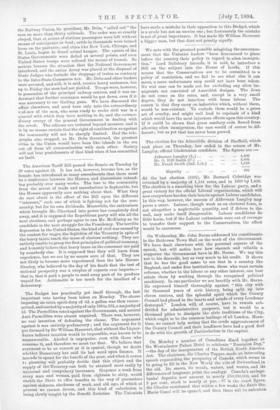The American Tariff Bill passed the Senate on Tuesday by
39 votes against 34. It has not, however, become law, as the Senate has introduced so many amendments that there must be a conference between the Houses, and discussions extend- ing probably over many weeks. The loss to the community from the arrest of trade and manufacture is deplorable, but the Houses apparently care nothing about that. What they do care about is the effect of the Bill upon the different "interests," each one of which is fighting not for the com- munity, but for its own dividends. Meanwhile, the enthusiasm which brought Mr. Cleveland into power has completely died away, and it is supposed the Republican party will win all the next elections, and perhaps agree to run Mr. McKinley as its candidate in the next struggle for the Presidency. The terrible depression in the United States, the kind of civil war caused by the contest for wages, the depletion of the Treasury in spite of the heavy taxes, teach the mass of electors nothing. They are entirely unable to grasp the first principles of political economy, and honestly believe that heavy taxes on the consumer are paid by somebody else. It is supposed that they will learn from experience, but we are by no means sure of that. They are not likely to become more experienced than the late Horace Greeley, who believed to the day of his death that the test of national prosperity was a surplus of exports over imports,— that is, that it paid a people to send away part of its produce unpaid for. Arithmetic is too much for the intellect of a democracy.










































 Previous page
Previous page